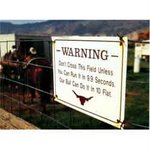‘A right to fight’
City signs for border land surveys, adds fuel to fence fire
January 16, 2008 - 11:36PM

G. Daniel Lopez/The Brownsville Herald
U.S. Army Corps of Engineers survey markers were placed in Hope Park several months ago. Without the mayor'c consent, the city has granted permission for the government to survey it's land for the border fence.
U.S. Army Corps of Engineers survey markers were placed in Hope Park several months ago. Without the mayor'c consent, the city has granted permission for the government to survey it's land for the border fence.
The government’s demand for permission to conduct their initial surveys had been held at bay for months by organized resistance movements led by border mayors, residents and other elected officials.
That is until last week when city officials signed on the dotted line and stepped aside, allowing the U.S. Army Corps of Engineers to access public land, including city parks near the Rio Grande.
“We didn’t want to risk our relationship with the Corps,” Commissioner Ricardo Longoria said Wednesday. “We’re depending on them for our resaca restoration project. ”
On Jan. 8, the city signed an agreement issued by the Department of Homeland Security allowing the Corps of Engineers onto city properties.
In an Oct. 16 meeting, the City Commission denied Mayor Pat Ahumada’s proposal to refuse access to government surveyors. According to Longoria, this denial constituted a vote to grant consent to the surveyors.
But between the October meeting and the signing of the DHS document, no public vote took place on the issue. City Manager Charlie Cabler said he signed the form in executive session, behind closed doors.
“It is the first I hear of it," City Attorney Jim Goza said Wednesday. "I wasn’t aware that a form had been signed or sent out.”
Goza could not recall a vote to allow access for land surveys and added that officials cannot vote in executive session.
“As far as Charlie (Cabler) signing the form,” Commissioner Leo Garza said, “I don’t remember us voting or authorizing him (to do that).”
The Department of Homeland Security sent a letter on Dec. 7 asking the city for its consent to survey land, but according to city officials, the letter was sent to the wrong address. As a result, officials say, the city didn’t respond until after DHS’ Jan. 6 deadline.
Although the form of consent was only recently signed, commissioners discussed the issue at several commission meetings in late 2007. They claim to have considered the expertise of federal representatives, including U.S. Rep. Solomon Ortiz, D-Corpus Christi.
“We were told that there wasn’t much we could do,” Longoria said. “It was out of our control.”
However, Ortiz claims he offered no such insight. "If I was a landowner I wouldn’t give consent,” he said.
“The city commissioners will have to make the decision on their own.”
Mayor Ahumada was not present at the Jan. 8 closed-door meeting. On Wednesday, he was incensed by the City Commission’s decision. Surveyors will now have access to property at Hope Park, Impala Park, and several other stretches of land that lie in the path of a proposed fence stretching 17 miles in Brownsville.
“We’re only making it easier for them to start this project,” Ahumada said. “Citizens will now be able to blame the commission if they don’t support the fence … We live in a divided city.”
Ahumada is an active member of the Texas Border Coalition, an organization composed largely of elected officials from border communities. The coalition offered to donate $25,000 toward the city’s legal defense, but now that commissioners have given their consent to DHS, Ahumada doubts that the funds will be available.
The Brownsville Public Utilities Board received the same letter from DHS asking for consent, but the board refused. PUB owns 300 acres of land on West 13th Street and another 130 acres in the Southmost area. The 13th Street property is the site of a river pumping station, a power plant, and a water reservoir.
PUB could become a defendant in one of the 102 lawsuits expected to be filed in the fight over a border fence.
On Monday, the Justice Department filed the first of such suits against the city of Eagle Pass. A day later, the judge ordered the city to temporarily turn over land to the federal government.
After land is surveyed, the federal government will begin the process of purchasing property that lies along the path of the fence. If landowners refuse to sell, they will be sued again.
“They have a right to fight the fence,” Congressman Ortiz said, “and that’s what they’re doing.”
Herald reporter Emma Perez-Trevino contributed to this story.






